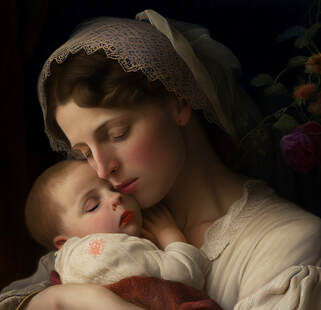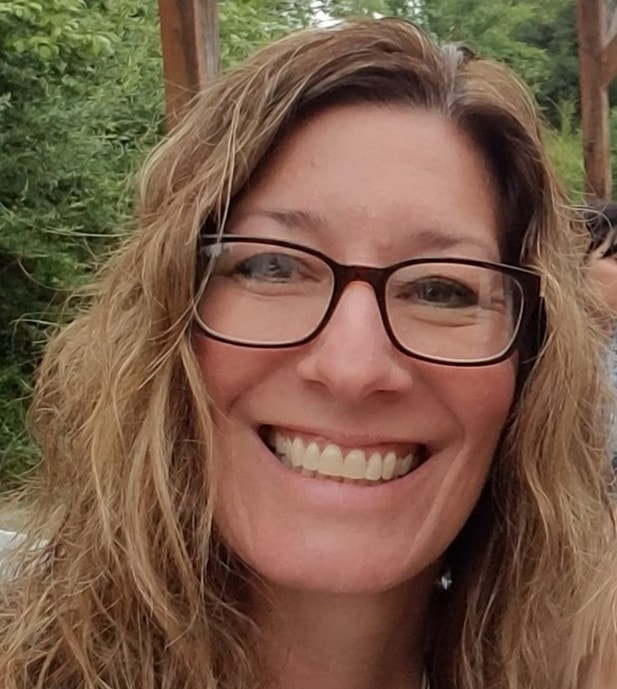|
There have been many important people throughout time, great men and women who have changed the course of world events. Yet all of them have something in common; they had a mother. It is mother that molds us in those early years, a time when the foundation of who we are is formed. Mother was the one who picked us up when we fell and brushed away our tears. And it was mother that made us eat right, do our homework, and yes, even disciplined us. Mother – the very word brings comfort. President Theodore Roosevelt once spoke, “ When all is said, it is the mother, who does her part in rearing and training aright the boys and girls who are to be the men and women of the next generation….it is she who is of greater use to the community, and occupies, if she would only realize it, a more honorable as well as a more important position than any man in it…She is more important, by far, than the successful statesman, or businessman, or artist, or scientist.” Mother – the most noble of all enterprises. Many of us have heard the story of Hannah, the Prophet Samuel’s mother. She lived in a time when Israel had no king; everyone did what was right in his own eyes (Judges 17:6). Up to this point, the Hebrew people were stuck in a period of cycles: they rebelled against God… began worshiping pagan deities…suffered the painful consequences of their actions…cried out to God for help…He sent them a judge to deliver them. For a while, the people returned to the Lord, that is until the judge died, then it was back to rebelling against God…and the cycle would start all over again. This cycle repeated itself seven times. The Israelites were a fractured group of ineffective tribal clans that could scarcely defend themselves against their enemies. Threats to their nation came from every corner of the land, but it was the Philistines they most dreaded. Into this climate came Hannah. She was the wife of Elkanah, a Levite living in Ephraim. Now, Elkanah loved Hannah, but he had another wife, Peninnah. Here was your classic love triangle. Peninnah was blessed with an open womb. Every time she turned around, she had another child. But Hannah was barren. In Hannah’s day, a woman’s sole purpose in life was to bear children, especially sons. With her womb empty, Hannah’s heart broke. Now every year, Elkanah went from his home and traveled on a pilgrimage to Shiloh in order to worship and sacrifice to the Lord of hosts. – for he was devoted to God. God’s law required the Israelites to attend three annual festivals a year. The Tabernacle was at Shiloh, for the Temple in Jerusalem had not yet been built. As was the custom, whenever Elkanah made an offering, he would give a portion to Peninnah and her children. But to Hannah, he would give a double portion, for he loved her. Peninnah would take every opportunity to taunt Hannah, speaking hurtful words because her rival had no children. It was a double wound – it was bad enough to be sad about not having children, but to be reminded constantly of her sorrow – that was just too much. Well, the time came for Elkanah to journey to Shiloh. The law did not require the women to accompany the men in these religious pilgrimages, but Hannah was devoted to her husband and to God, so she went with him. And of course, Peninnah went also. While in Shiloh, the taunting of Peninnah came to a head. She was relentless in her ridicule. Hannah became so depressed that she wept and could not eat. Sweet Elkanah, he loved Hannah so much. He could not bear to see her is such distress. He tried to comfort her with these words, “Hannah, why do you weep? Why do you not eat? And why is your heart grieved?– – Am I not better to you than ten sons?” Though Hannah loved her husband, his words did not relieve the sorrow she bore. So she arose and went to the Tabernacle to pray. – You see, she took her burden to the Lord. Be anxious for nothing, but in everything by prayer and supplication, with thanksgiving, let your requests be made known to God; and the peace of God, which surpasses all understanding, will guard your hearts and minds through Christ Jesus." She was not alone. Eli the priest was sitting on the seat by the doorpost of the Tabernacle of the Lord. And in the bitterness of her soul, she prayed to the Lord, weeping. In the anguish, she prayed her way through. The effective, fervent prayer of a righteous man avails much." In Hannah is an example of fervent and prevailing prayer. Then she made a vow and said, “O Lord of hosts, if You will indeed look on the affliction of Your maidservant and remember me, and not forget Your maidservant, but will give Your maidservant a male child, then I will give him to the Lord all the days of his life, and no razor shall come upon his head.” – She asked a specific prayer – give me a male child. Not an anemic, broad prayer, but a specific prayer of her need. – And she made a promise, she would not keep the child, but give him back to the Lord. Remember, Elkanah was a Levite. Levites were required to serve in the Tabernacle from age twenty-five to fifty. Hannah promised to give the child for a lifetime of service. – As Hannah prayed for a child – a new era was about to begin. Sometimes the reasons for our trials are not evident. But we have to trust that God has a plan, and He is acting on that plan. Now Eli, the priest kept his eye on Hannah. As Hannah spoke, her lips moved, but no voice was heard, for she spoke in her heart. All the while, Eli watched. He began to form an opinion of this woman based on his preconceived idea of how one was to behave in the Tabernacle. During this time, prayer was always spoken out loud. So Eli said to her, “How long will you be drunk? Put your wine away from you!” But Hannah answered and said, “No, my lord, I am a woman of sorrowful spirit. I have drunk neither wine nor intoxicating drink, but have poured out my soul before the Lord. Do not consider your maidservant a wicked woman, for out of the abundance of my complaint and grief I have spoken until now.” Hannah poured out her soul. This was more than just saying a prayer. She emptied herself before the Lord until she was utterly spent. She gave it all to God, nothing was left which was not given. Then Eli answered and said, “Go in peace, and the God of Israel grant your petition which you have asked of Him.” And she said, “Let your maidservant find favor in your sight.” So then Hannah went her way and ate, and her face was no longer sad. – Did you get that? She went, and ate, and she was no longer sad. She left her burden before the Lord. She did not pick it up and take it with her. She left it there, though there was no actual evidence that her prayer had been answered. – she experienced God’s peace How often we carry away with us anxiety and grief– But she believed that God would take care of it. Therefore I say to you, whatever things you ask when you pray, believe that you receive them, The Lord remembered Hannah. And she conceived and bore a son, and called his name Samuel, “Because I have asked for him from the Lord.” - She remembered who gave her the child. He was a gift from God. Now it was time again for the trek to Shiloh, but Hannah refused to go, saying, “Not until the child is weaned; then I will take him, that he may appear before the Lord and remain there forever.” Elkanah could have prohibited Hannah’s vow (Numbers 30:10-15), refusing to leave his son at the Tabernacle, but he didn’t. In this he showed his great love and esteem for his wife, Hannah. Now when she had weaned Samuel, she took him up with her, with her sacrifice, and brought him to the house of the Lord in Shiloh. And the child was young. – Children were usually weaned by the age of two or three. What a heartache that must have been. Yet Hannah was faithful to her promise, and gave Samuel to the Lord’s service, just as she had vowed. Then they slaughtered a bull, and brought the child to Eli. And she said, “O my lord! As your soul lives, my lord, I am the woman who stood by you here, praying to the Lord. For this child I prayed, and the Lord has granted me my petition which I asked of Him. Therefore I also have lent him to the Lord; as long as he lives he shall be lent to the Lord.” – Remember me? Hannah gives Eli her testimony – she exalts God and praises Him for His gracious act toward her. So they worshiped the Lord there. – they worshiped. Not just Hannah, but Eli too. A humble response in grateful acknowledgement of the majesty of God. Every year, Hannah would make Samuel a little robe and take it to him. – I can just see Hannah working on this robe anticipating the time she would see her son again. Even when our children are no longer under our roof, our concern for them is not over. Yet, that is not the end of the story, for gracious is our Lord, who gives in full measure, abundant and overflowing! And as Samuel ministered before the Lord, the boy grew and became a king maker*. Under his guidance, the nation returned to the worship of the One True God. The fractured tribes became a united nation of one people. Samuel became a great man of God. And Hannah, she was not forgotten. Her womb was opened, and she was blessed with many children. God is able to give us even more than what we ask." What made Hannah a good mother? – She was devoted to her husband. Our relationship with our spouse has great influence on our children. This is one reason we are commanded to love the person we marry (Ephesians 5:28; Titus 2:4). We demonstrate our obedience to God when we love our mate. But not just the feeling of love, but love in action, love in deed, love in words. My little children, let us not love in word or in tongue, but in deed and in truth." Through our interaction with our spouse, we are teaching our children how to relate to one another. -She was devoted to her God When Hannah prayed, she did not pray for men to hear – remember, she prayed silently, only her lips moved, but no voice was heard. She knew that Elkanah, her husband, was not the source of children… – God was the source From the depths of her soul, Hannah spoke to God. Both, Elkanah and Hannah had a deep faith in God. They genuinely believed and expressed their devotion to the Lord through their actions. Theirs was more than a feel good experience. They laid it all bare for all to see – they were completely in love and devoted to each other, and to God. We are admonished to bring up our children in the way they should go. With this command, we are given a promise. Train up a child in the way he should go, And when he is old he will not depart from it." Our children are often left without direction to find their way in a world that thinks they don’t need God. Faith in God is not enough. If we want our children to believe in God and to live a life that is pleasing Him, we must model it to our kids. The Lord redeemed a nation through one man. – He can do it again One individual has the power to shape a nation, or even change the world – and that persons owes a debt to their mother. Who knows – it may be your child. Happy Mother’s Day, Susan Van Volkenburgh* See how Samuel became a king maker in my novel: The Anointed One Book 2: Trilogy of Kings
0 Comments
|
Susan
|



 RSS Feed
RSS Feed